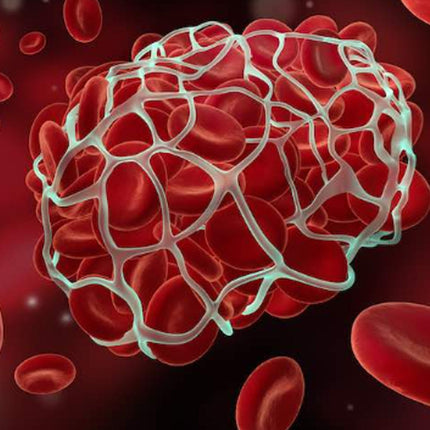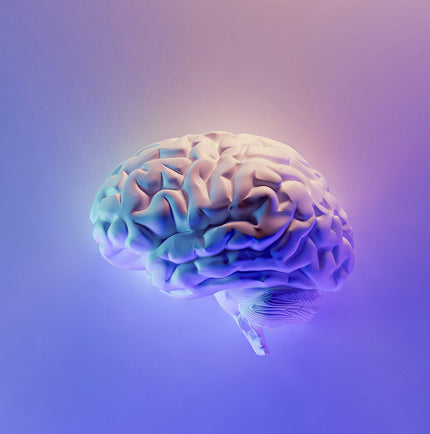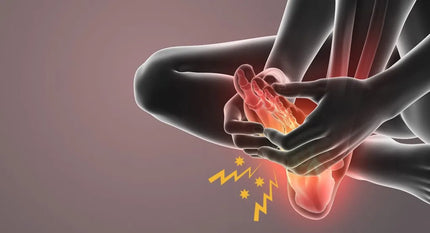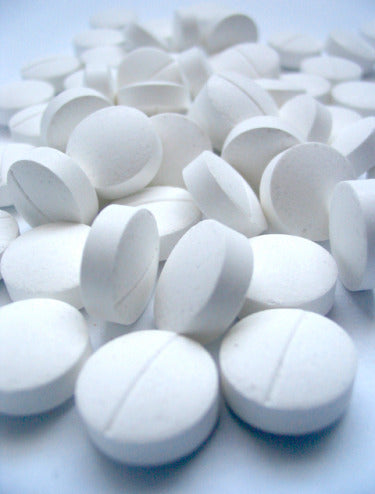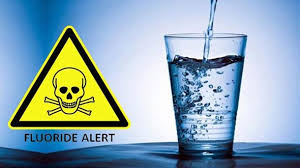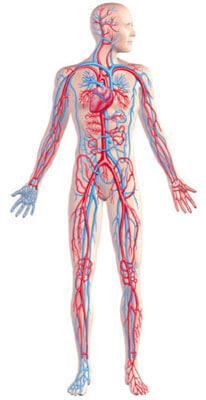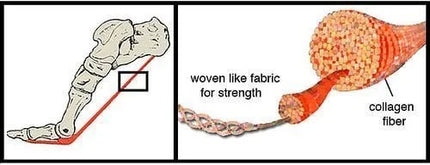Tax included and shipping calculated at checkout
It is understandable if you feel bamboozled by all the different labels that have been given to the same set of symptoms (syndrome) over decades. Significant clinical research has been ongoing in the area of chronic illness presenting as extreme and persistent fatigue. A few decades ago it became popularly known as Chronic Fatigue Syndrome (CFS), but has also been labelled by researchers as: Myalgic Encephalomyelitis and Neurasthenia, and more recently as Post-Viral Fatigue Syndrome or Long Covid.
Inflammatory symptoms of long covid mimicking magnesium deficiency
Symptoms commonly occur after an acute viral infection where the illness isn’t fully resolved and a low-level chronic inflammatory state persists. The symptoms include incapacitating and persistent fatigue, muscle aches, joint pains, weakness after exercise, headaches, swollen glands, digestive disorders, inability to concentrate, memory loss, recurring minor infections or low-grade fevers, depression, an increasing sense of being unable to function, sleep disturbance, light sensitivity, food intolerance and environmental allergies.

In the 1990’s it was common for doctors to dismiss these accounts as merely in the patient’s head, or psychosomatic. The syndrome had been relegated to a popular myth, instead of the inflammatory disease that it was. Even though doctors correctly connected high levels of stress with the symptoms, prescribing psychiatric drugs did not address the problem’s cause, and often made the symptoms worse.
Fibromyalgia has similar chronic inflammatory symptoms, and is also brought on by excessive stress

- fatigue
- lack of energy
- trouble sleeping
- depression or anxiety
- memory problems and trouble concentrating (sometimes called “fibro fog”)
- headaches, muscle and joint pain
- muscle twitches or cramps
- numbness or tingling in the hands and feet
- itching, burning, and other skin problems
Long Covid seems to present with stronger, more acute inflammatory symptoms. It commonly affects the lungs, brain, heart, gastro-intestinal system, and the kidneys. Patients can experience hair loss, fatigue, muscular weakness, joint pain (arthralgia), followed by dyspnea (labored breathing) or cough, and chest pain and palpitation. Neurological symptoms also occur frequently, such as headache, sleep disorders, anxiety and depression, and cognitive disturbances including lack of concentration or ‘brain fog’.
Stress weakens the immune system and leads to inflammatory diseases
Excessive stress is most often the trigger for inflammation. Chronic or acute stress causes the immune system to become hypersensitive and over-stimulated with a flood of cytokines, which produce excessive Reactive Oxygen Species (ROS) and acidosis. An inability to correct the pH of cells suffering acidic conditions due to the waste toxins, worsens symptoms and increases deterioration.

This constant revving of the immune system without resolution eventually leads to immune exhaustion and therefore chronic inflammation and pain. It is not limited to affecting muscles and joints, but also invades the Central Nervous System (CNS) and alters how the brain processes pain, leading to hypersensitivity, anxiety, insomnia, excessive emotionality, and even depression. In other words, excessive pain and stress is very depressive.
The lower the magnesium reserves, the more prone people become to hypersensitivity because magnesium modulates the hypothalamic-pituitary adrenal (HPA) axis. 1 Excessive stress can induce states of chronic anxiety, and that anxiety is itself an extra stress load on the nervous system. One response begets the other, looping back again as entrapment in a kind of revolving door.
When the stress load has gone too far for too long, not enough resources are available to complete full recovery, and inflammation in the body, including the Central Nervous System (CNS), grows. “When a certain stress-tolerance-level is exceeded, the hypothalamic PVN [Paraventricular Nucleus] can become an epicenter for microglia-induced activation and neuroinflammation, affecting the hypothalamus and its proximal limbic system, which would account for the range of reported ME/CFS-like symptoms.” 2
Post Traumatic Stress Disorder (PTSD) also shares the same pattern of symptoms. It is another example of excessive stress depressing the immune system, which then invites Chronic Fatigue Syndrome symptoms with neuroinflammation. It should be noted that stress alone can trigger CFS-like symptoms, without necessarily involving a viral infection first. However, viral infections have often been a co-factor due to the vulnerability of the immune system as a result of excessive stress.
It’s hard sometimes to know what the chicken and what the egg is, as these triggers and symptoms form a feedback-loop. The stress causes chronic pain and fatigue, and the pain is another stress that furthers depletion. To make matters even more complex, these CFS-like or Long Covid symptoms are not isolated to those suffering malnutrition, old age or disease states such as diabetes, but can be experienced also by fit athletes in their prime if they have over-trained and therefore over-stressed themselves (which is a state that weakens the immune system).

Whilst moderate and regular exercise can partially stimulate the immune response (via increased lymph and blood circulation, and oxygenation), intense exercise (without adequate recovery) may trigger immunosuppression due to excessive stress depleting magnesium reserves. Magnesium deficiency, and consequential weakening of the immune system, is thus exacerbated. It makes athletes that over-train more prone to viral infection, further depleting reserves. Recovery can become a long road. In a longitudinal assessment in varsity athletes it was found that, “Both aerobic and anaerobic exercise variables are seriously affected by post-viral fatigue syndrome, and one year may not be sufficient to fully recover.” 3
Summary of causes of the syndrome
- Chronic or traumatic stress trigger
- Weakened immunity
- Viral or toxic exposure
- Magnesium deficiency. Even sub-clinical tissue levels of magnesium can have deleterious effects. Muscles and bones contain 99% of the body’s magnesium supply, with only 1% of magnesium in the blood. Plasma levels of magnesium decline only after the tissue levels have become severely depleted. Measurement of plasma levels therefore does not accurately reflect the tissue levels of magnesium. For this reason magnesium deficiency often slips through the cracks and is left undiagnosed. Clusters of magnesium deficiency symptoms can be a good guide. Red blood cells can also be analysed. However, many health practitioners prefer the tissue analysis of EXA testing.
Magnesium deficiency can cause metabolic syndrome, diabetes, obesity and heart disease
Researchers have now identified magnesium as being involved in over 600 enzyme reactions and even more when one considers the many co-factoring roles with other nutrients. Magnesium regulates calcium, and is absolutely essential in mitochondrial metabolism.

Magnesium is associated with insulin sensitivity, production of ATP, and therefore energy production. A deficiency in magnesium is associated with a low oxygen, acidic and toxic state, which are the inflammatory conditions of metabolic syndrome, diabetes, obesity and heart disease. In fact, it has been shown in several studies that magnesium deficiency puts people at high risk of developing metabolic diseases.
The lower the magnesium, the more sugar-sensitive and insulin-sensitive people become. Once inflammation with magnesium deficiency sets in, the pH becomes hard to control and stabilise, leading to acidosis. However, the more optimal the magnesium reserves, the less likely to get metabolic syndrome and insulin resistance. There is an inverse relationship, like a see-saw effect.
Magnesium is by far the master mineral, having the most influence on energy metabolism, which drives all biological systems. By the time you see calcium or potassium deficiency symptoms, magnesium will have dropped below normal first.
Magnesium also has a great affinity with water and so is essential in cell hydration and electrical activity. It participates in enzyme and protein synthesis (including the antioxidant and detoxification enzymes of glutathione and superoxide dismutase), as well as the carrying of oxygen in the haemoglobin.
Magnesium plays a critical role in innate immunoregulation and mainly acts intra-cellularly, decreasing inflammatory cytokine production. It dampens down adrenalin and calcium stress responses, helps to produce GABA (gamma-aminobutyric acid), and supports ACE2 in the angiotensin system. All of these effects are anti-stress and anti-inflammatory.
A review article from the Journal of Inflammation Research concluded: “Animal studies have shown that magnesium deficiency induces an inflammatory response that results in leukocyte and macrophage activation, release of inflammatory cytokines and acute-phase proteins, and excessive production of free radicals…. The primary mechanism through which magnesium deficiency has this effect is through increasing cellular Ca2+, which is the signal that results in the priming of cells to give the inflammatory response. Primary pro-inflammatory cytokines such as tumor necrosis factor-α and interleukin (IL)-1; the messenger cytokine IL-6; cytokine responders E-selectin, intracellular adhesion molecule-1 and vascular cell adhesion molecule-1; and acute-phase reactants C-reactive protein and fibrinogen have been determined to associate magnesium deficiency with chronic low-grade inflammation (inflammatory stress).“ 4
Chronic inflammation in a weakened immune system can cause thrombosis
Magnesium deficiency and inflammatory symptoms can cause thrombus formation. A magnesium deficiency induces a rise in circulating white blood cells, together with a consequent decrease in B cells as a percentage, which makes the immune response less potent. 5 B and T cells work in tandem to remove pathogens, and to record in cell memory how to counter that foreign element or pathogen, in case there is a future exposure. “The B Cells have the ability to transform into plasmocytes and are responsible for producing antibodies (Abs). Thus, humoral immunity depends on the B Cells while cell immunity depends on the T Cells.” 6

The decrease in the potency of white blood cells, via less B and T cells from a low magnesium state, means that more leukocytes are needed to be produced to get the job done. Recovery from inflammation (low grade or reoccurring episodes) consequently takes a lot longer. Inflammatory states can thus become chronic.
When the immune system is having a war with ‘something’ it generates a lot more cytokines and acidic waste products, which then cause more positive charge and platelet stickiness. Activation of the immune system strongly influences blood coagulation and formation of thromboembolism.
According to a review by the American Society of Hematology, “Leukocytes can be induced to express tissue factor and release proinflammatory and procoagulant molecules such as granular enzymes, cytokines, and damage-associated molecular patterns. These mediators can influence all aspects of thrombus formation, including platelet activation and adhesion, and activation of the intrinsic and extrinsic coagulation pathways.” 7
Therefore, excessive white blood cells can form blood clots, however magnesium can counter this effect because it is naturally anti-thrombotic. In a review of magnesium as an antithrombotic therapy they found, “High dose of intravenous magnesium can inhibit thrombus formation and is associated with suppression of platelet aggregation. Magnesium treatment can dose-dependently inhibit a wide variety of agonists of platelet aggregation, such as thromboxane A2 and stimulate prostacyclin synthesis. The molecular basis for these effects is likely modulated via reduction of intracellular calcium mobilization. Hypomagnesemia also selectively impaired the release of nitric oxide from the coronary endothelium. “ 8
Magnesium’s role in activating Vitamin D leads to improved immune function
There is a correlation between low vitamin D levels and autoimmune diseases, such as multiple sclerosis, rheumatoid arthritis, diabetes mellitus, and inflammatory bowel disease.

Vitamin D requires magnesium to be activated. Researchers have confirmed that vitamin D supplementation alone will not resolve the immune impotency. Magnesium is needed to both synthesise and activate vitamin D to play a protective role in the immune system.
A recent 2022 review in Frontiers in Endocrinology stated, “A key mechanism by which vitamin D reduces inflammatory cytokines is by upregulating T regulatory lymphocytes. Magnesium’s role in activating vitamin D leads to improved immune function, which can reduce the severity of the cytokine storm in COVID-19 infection.” 9 They concluded that the anti-inflammatory effects of magnesium are potentially responsible for reducing symptoms of asthma patients treated with magnesium, and that adequate magnesium levels have been associated with lower mortality rates in COVID-19 patients and less severe symptoms.
Magnesium relaxes the cardiovascular system and relieves asthma
Magnesium is antagonistic to calcium. When there is not enough magnesium to regulate calcium, there is an increase in muscle cramps, spasms and tension – as well as dehydration. Magnesium however attracts water molecules and improves hydration, which facilitates detoxification, improved mitochondrial metabolism, and electrical conduction of cells. This supports pH balance, blood fluidity and flexibility.

The smooth muscles of endothelial linings in the cardiovascular system cannot maintain integrity without sufficient magnesium. If free calcium deposits in the endothelium, the blood vessels can become stiff, which increases blood pressure (ie. hypertension).
The relaxation effect can also be seen with magnesium treatment in asthma, which has consistently demonstrated alleviation of muscle constriction in airways and irritating cough.
If breathing is restricted and laboured, the resulting hypoxia causes excessive adrenalin release. The body in a sense ‘panics’. So, the more that can be done to relax and move from sympathetic (fight or flight) to parasympathetic (rest and digest), the better.
Stress often provokes asthmatic symptoms due to a surge in adrenalin, which pushes calcium into the membrane channels, causing contraction and dehydration of smooth muscles in lungs. Stress causes excessive loss of magnesium. As we need magnesium to dampen the adrenalin and calcium response, when it is deficient, the airways remain restricted and congested.
Spike proteins are toxic, block ACE2 receptors and injure endothelial linings of the cardiovascular system
Magnesium is protective of cells and stands guard as part of the membrane to ensure its integrity and regulation of calcium channels. In fact, researchers believe that magnesium stored as part of ATP works as a storage battery to potentiate energy as required.
Magnesium is integral in the function of the Angiotensin-converting enzyme 2 (ACE2) system. ACE2 is an enzyme attached to the membrane of cells in the intestines, kidney, testis, gallbladder, and heart, which lowers blood pressure by reducing the amount of angiotensin-II and increasing Ang(1-7). Angiotensin is a peptide hormone that causes vasoconstriction (via calcium movement) and an increase in blood pressure, as well as inflammatory conditions.
Studies have shown that whole body deficiency of endogenous ACE2, as well as deficiency in bone marrow-derived cells, increased atherosclerosis in mice.10 A deficiency in ACE2 is shown to be a trigger for inflammation (like magnesium deficiency).
The SARS-CoV-2 spike protein is toxic and known to damage the endothelium via downregulation of ACE2. The spike protein is a key that unlocks ACE2 receptors, which then mediate the entry into the cell of three strains of coronavirus: SARS-CoV, NL63 and SARS-CoV-2. 11
When these receptor doorways are occupied by spike proteins to facilitate entry of the viruses, the access of ACE2 to the cell is restricted, which contributes to an exacerbated inflammatory response. The endothelial lining of the vascular system thus becomes vulnerable to damage due to less flexibility, acidosis, too much free calcium, and not enough magnesium.
In summary, ACE2 plays a vital role in the regulation of cardiovascular and renal function, as well as fertility, via its protection of the endothelium from inflammation. Its deficiency is associated with magnesium deficiency, cardiovascular disease and eventually multi-organ failure.
Treatment strategies
A recent COVID-19 review noted that, “Adequate magnesium levels have been associated with lower mortality rates in COVID-19 patients and less severe symptoms.” 9
Rest and deep sleep, together with supplemental nutrients like magnesium and vitamin D are essential for alleviating symptoms and to recover from Long Covid and Post-Viral Fatigue (a.k.a. Chronic Fatigue) syndrome. The primary goal in support of the immune system is to help the body cleanse and detoxify with attention to gut health, adjust pH (avoiding acidosis), increase oxygen delivery and circulation, and supply the essential nutrients to build new cells and support mitochondrial metabolism.
In acute cases, such as with arrhythmias or organ failures, intravenous magnesium can be used as a treatment. Oral magnesium tablets and powders pose digestion issues or bowel irritation (particularly during illness), so the majority of the magnesium is lost by the digestive system, and not much passes through the gut wall.
A more popular alternative is transdermal magnesium. The most bioavailable form of magnesium is magnesium chloride (salt). Once dissolved, it is already in the right form for cellular uptake and can be easily absorbed in a bath.

Epsom salts (magnesium sulphate) can also be used for bathing, however the sulphate component can be drying and irritating for skin with frequent exposures. Magnesium chloride hexahydrate however provides a higher concentration of magnesium with extra trace minerals, and is more soothing and supportive of skin.
Extra transdermal absorption without involving the digestive system is available via Magnesium Cream, Magnesium Lotion and Magnesium Oil, or a combination thereof. The incorporation of plant butters and oils facilitates absorption of magnesium. One can potentially absorb over 1,000mg daily of magnesium via skin without any risk of overdose, as the epidermis acts as a reservoir, allowing the body to absorb gradually over time as needed. It is best to spread out the applications to morning and evening, rather than all at one time once a day.

As most people tend to be magnesium deficient in modern times due to soil depletion, food processing and excessive stresses, it’s a good idea to make daily magnesium skin and muscle care part of a healthy lifestyle routine. Magnesium massage is very comforting and relaxing, and promotes a more restful sleep. The benefits of muscle relaxation and calming effect can be felt almost immediately. Remember that inflammation is fuelled by excessive unresolved stress and magnesium depletion, and is calmed by the removal of stress (including toxic stress) and restoration of magnesium homeostasis.
By Sandy Sanderson © 2022 www.elektramagnesium.com.au
(1) Sartori, S. B.; Whittle, N.; Hetzenauer, A.; Singewald, N. Magnesium Deficiency Induces Anxiety and HPA Axis Dysregulation: Modulation by Therapeutic Drug Treatment. Neuropharmacology 2012, 62 (1), 304–312. https://doi.org/10.1016/j.neuropharm.2011.07.027.
(2) Mackay, A. A Paradigm for Post-Covid-19 Fatigue Syndrome Analogous to ME/CFS. Front Neurol 2021, 12, 701419. https://doi.org/10.3389/fneur.2021.701419.
(3) Maffulli, N.; Testa, V.; Capasso, G. Post-Viral Fatigue Syndrome. A Longitudinal Assessment in Varsity Athletes. J Sports Med Phys Fitness 1993, 33 (4), 392–399.
(4) Nielsen, F. H. Magnesium Deficiency and Increased Inflammation: Current Perspectives. J Inflamm Res 2018, 11, 25–34. https://doi.org/10.2147/JIR.S136742.
(5) Van Orden, R.; Eggett, D. L.; Franz, K. B. Influence of Graded Magnesium Deficiencies on White Blood Cell Counts and Lymphocyte Subpopulations in Rats. Magnes Res 2006, 19 (2), 93–101.
(6) Cano, R. L. E.; Lopera, H. D. E. Introduction to T and B Lymphocytes; El Rosario University Press, 2013.
(7) Swystun, L. L.; Liaw, P. C. The Role of Leukocytes in Thrombosis. Blood 2016, 128 (6), 753–762. https://doi.org/10.1182/blood-2016-05-718114.
(8) Shechter, M. The Role of Magnesium as Antithrombotic Therapy. Wien Med Wochenschr 2000, 150 (15–16), 343–347.
(9) Eskander, M.; Razzaque, M. S. Can Maintaining Optimal Magnesium Balance Reduce the Disease Severity of COVID-19 Patients? Front Endocrinol (Lausanne) 2022, 13, 843152. https://doi.org/10.3389/fendo.2022.843152.
(10) Scialo, F.; Daniele, A.; Amato, F.; Pastore, L.; Matera, M. G.; Cazzola, M.; Castaldo, G.; Bianco, A. ACE2: The Major Cell Entry Receptor for SARS-CoV-2. Lung 2020, 198 (6), 867–877. https://doi.org/10.1007/s00408-020-00408-4.
(11) Verdecchia, P.; Cavallini, C.; Spanevello, A.; Angeli, F. The Pivotal Link between ACE2 Deficiency and SARS-CoV-2 Infection. Eur J Intern Med 2020, 76, 14–20. https://doi.org/10.1016/j.ejim.2020.04.037.








